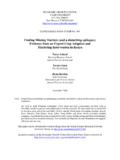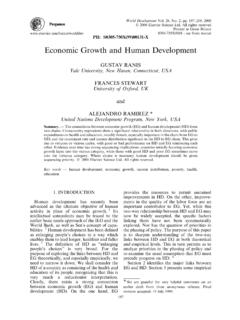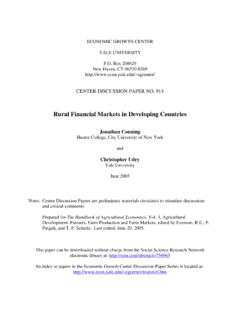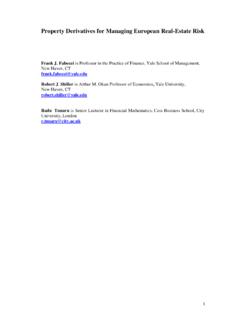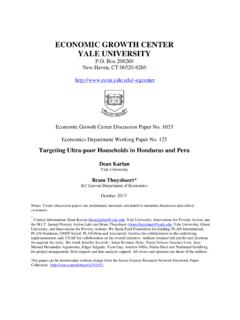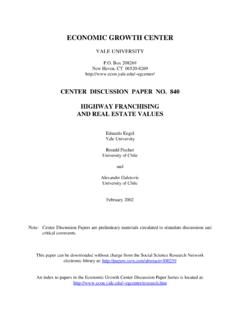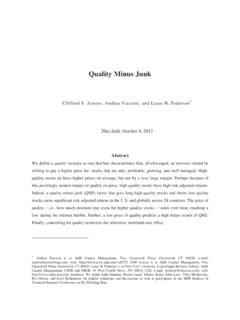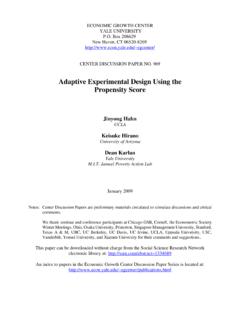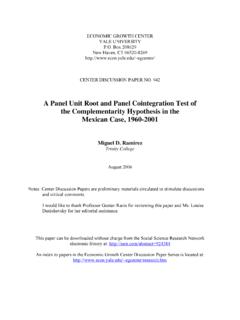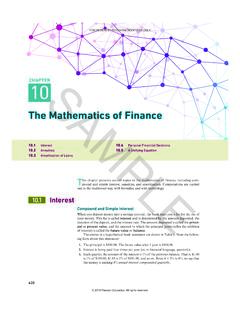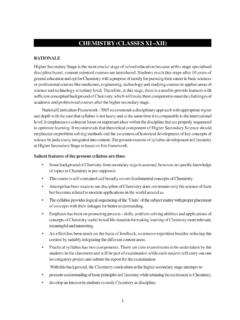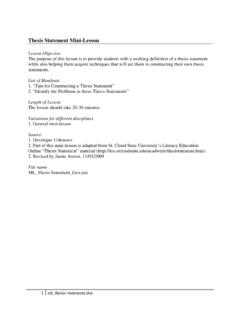Transcription of Economic Possibilities for our - Yale University
1 Keynes on Possibilities 1 John Maynard Keynes, Economic Possibilities for our Grandchildren (1930)* I We are suffering just now from a bad attack of Economic pessimism. It is common to hear people say that the epoch of enormous Economic progress which characterised the nineteenth century is over; that the rapid improvement in the standard of life is now going to slow down --at any rate in Great Britain; that a decline in prosperity is more likely than an improvement in the decade which lies ahead of us. I believe that this is a wildly mistaken interpretation of what is happening to us. We are suffering, not from the rheumatics of old age, but from the growing-pains of over-rapid changes, from the painfulness of readjustment between one Economic period and another.
2 The increase of technical efficiency has been taking place faster than we can deal with the problem of labour absorption; the improvement in the standard of life has been a little too quick; the banking and monetary system of the world has been preventing the rate of interest from falling as fast as equilibrium requires. And even so, the waste and confusion which ensue relate to not more than 7 per cent of the national income; we are muddling away one and sixpence in the , and have only 18s. 6d., when we might, if we were more sensible, have 1 ; yet, nevertheless, the 18s. 6d. mounts up to as much as the 1 would have been five or six years ago. We forget that in 1929 the physical output of the industry of Great Britain was greater than ever before, and that the net surplus of our foreign balance available for new foreign investment, after paying for all our imports, was greater last year than that of any other country, being indeed 50 per cent greater than the corresponding surplus of the United States.
3 Or again-if it is to be a matter of comparisons-suppose that we were to reduce our wages by a half, repudiate four fifths of the national debt, and hoard our surplus wealth in barren gold instead of lending it at 6 per cent or more, we should resemble the now much-envied France. But would it be an improvement? The prevailing world depression, the enormous anomaly of unemployment in a world full of wants, the disastrous mistakes we have made, blind us to what is going on under the surface to the true interpretation. of the trend of things. For I predict that both of the two opposed errors of pessimism which now make so much noise in the world will be proved wrong in our own time-the pessimism of the revolutionaries who think that things are so bad that nothing can save us but violent change, and the pessimism of the reactionaries who consider the balance of our Economic and social life so precarious that we must risk no experiments.
4 My purpose in this essay, however, is not to examine the present or the near future, but to disembarrass myself of short views and take wings into the future. What can we reasonably expect the level of our Economic life to be a hundred years hence? What are the Economic Possibilities for our grandchildren? From the earliest times of which we have record-back, say, to two thousand Space for Notes Keynes on Possibilities 2 years before Christ-down to the beginning of the eighteenth century, there was no very great change in the standard of life of the average man living in the civilised centres of the earth.
5 Ups and downs certainly. Visitations of plague, famine, and war. Golden intervals. But no progressive, violent change. Some periods perhaps So per cent better than othersat the utmost 1 00 per cent better-in the four thousand years which ended (say) in A. D. 1700. This slow rate of progress, or lack of progress, was due to two reasons-to the remarkable absence of important technical improvements and to the failure of capital to accumulate. The absence of important technical inventions between the prehistoric age and comparatively modern times is truly remarkable. Almost everything which really matters and which the world possessed at the commencement of the modern age was already known to man at the dawn of history.
6 Language, fire, the same domestic animals which we have to-day, wheat, barley, the vine and the olive, the plough, the wheel, the oar, the sail, leather, linen and cloth, bricks and pots, gold and silver, copper, tin, and lead-and iron was added to the list before 1000 , statecraft, mathematics, astronomy, and religion. There is no record of when we first possessed these things. At some epoch before the dawn of history perhaps even in one of the comfortable intervals before the last ice age-there must have been an era of progress and invention comparable to that in which we live to-day. But through the greater part of recorded history there was nothing of the kind.
7 The modern age opened; I think, with the accumulation of capital which began in the sixteenth century. I believe-for reasons with which I must not encumber the present argument-that this was initially due to the rise of prices, and the profits to which that led, which resulted from the treasure of gold and silver which Spain brought from the New World into the Old. From that time until to-day the power of accumulation by compound interest , which seems to have been sleeping for many generations, was re-born and renewed its strength. And the power of compound interest over two hundred years is such as to stagger the imagination. Let me give in illustration of this a sum which I have worked out.
8 The value of Great Britain s foreign investments to-day is estimated at about 4,000,000,000. This yields us an income at the rate of about 6 per cent. Half of this we bring home and enjoy; the other half, namely, 3 per cent, we leave to accumulate abroad at compound interest . Something of this sort has now been going on for about 250 years. For I trace the beginnings of British foreign investment to the treasure which Drake stole from Spain in 1580. In that year he returned to England bringing with him the prodigious spoils of the Golden Hind. Queen Elizabeth was a considerable shareholder in the syndicate which had financed the expedition.
9 Out of her share she paid off the whole of England s foreign debt, balanced her Budget, and found herself with about 40,000 in hand. This she invested in the Levant Company --which prospered. Out of the profits of the Levant Company, the East India Company was founded; and the profits of this great enterprise were the foundation of England s subsequent foreign investment. Now it happens that 40,ooo accumulating at 3f per cent compound interest approximately corresponds to the actual volume of England s foreign investments at various dates, and would actually amount to-day to the total of 4,000,000,000 which I have already quoted as being what our foreign Keynes on Possibilities 3 investments now are.
10 Thus, every 1 which Drake brought home in 1580 has now become 100,000. Such is the power of compound interest ! From the sixteenth century, with a cumulative crescendo after the eighteenth, the great age of science and technical inventions began, which since the beginning of the nineteenth century has been in full flood--coal, steam, electricity, petrol, steel, rubber, cotton, the chemical industries, automatic machinery and the methods of mass production, wireless, printing, Newton, Darwin, and Einstein, and thousands of other things and men too famous and familiar to catalogue. What is the result? In spite of an enormous growth in the population of the world, which it has been necessary to equip with houses and machines, the average standard of life in Europe and the United States has been raised, I think, about fourfold.
